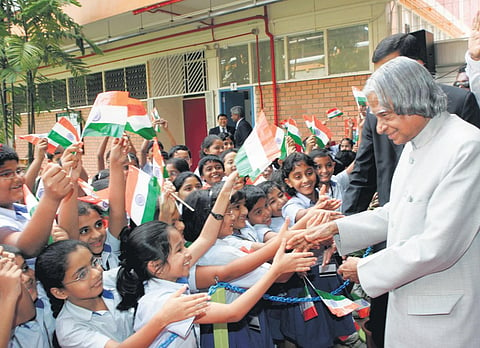

CHENNAI: Children witnessed the absolute power of Dr APJ Abdul Kalam’s story-telling. Almost everything a child heard and saw in Rashtrapati Bhavan is tucked away for remembering. He was the only Indian President who really knew how to tell a story. The more they listened to him, the better they connected with him. Like the stories he told, his life too was fascinating.
More importantly, perhaps, children in Rashtrapathi Bhavan were an experiment; a model for other leaders to engage young minds. Spinning magic with words, Dr Kalam taught children to look for miracles even in unlikely places. He knew how to handle children perfectly because at heart, he was a child himself. His zest for life didn’t flag even at 83. Throughout his life he awakened in children and youth, a curiosity and love for the world. Dr Kalam called his interactions with youth as ‘wonders of life’. As a scientist and teacher for more than four decades, Dr Kalam shaped thousands of youngsters.
Encouraging children
“I honour my debt to my parents by giving abundant love to children,” Dr Kalam told Harry Sheridon (his personal secretary) in a tone that had a minor triumph in itself. Few people close to Dr Kalam wondered aloud if his talks on dreams will really make an impact. That’s when he would answer in a confident tone with his unassuming smile, “Many aren’t blessed with optimal situations, you know.
The fire in them needs kindling at regular intervals.” In a country like ours where the advancement of education is a continuing challenge, Dr Kalam’s was a massive effort in consolidating moral visions. He was keen on retaining the very fibre of our country and forging a covenant that will strengthen bonds. “If I don’t trigger them to reach as far as their talents and determination can take them, I fail in my duty,” Dr Kalam would say, his voice full of conviction.
Once on a flight to Chennai from Delhi, a youngster pursuing a postgraduate medical degree told Dr Kalam, “Sir, but for your lecture on perseverance that I listened to as a school kid in Dehradun I wouldn’t have persevered to come this far.” That boy was euphoric when Dr Kalam responded with the same vigour, “Fantastic my boy, you just shouldn’t stop.”
Alongside Dr Kalam, kids seemed fervid. Occasionally when teachers tried to shush students from asking certain questions, Dr Kalam politely requested that they don’t intimidate kids. And, their conversations revolved around Dr Kalam’s hairstyle, his decision to stay back in India, bachelor status, school days, food habits and disappointments. His anecdotes were laced with messages, about opportunities that need to be grabbed and duties that have to be fulfilled. Thus, Dr Kalam helped them recognise their obligation to our country and to mankind.
There were instances when kids were accompanied by parents, enthusiastic and keen enough to answer questions posed by Dr Kalam. Making small noises of dissent he would tell parents to let the kids take their time and that he was in no hurry to wind up. “The question was to the child, I say,” Dr Kalam would chuckle trying hard to conceal his disappointment. “Please let him/her think.”
Once while relaxing in the airport lounge, Sheridon saw a girl talking to the security personnel. Frustration was writ all over her face. Going by her gestures Sheridon understood she wanted to meet Dr Kalam. So, he briefed Dr Kalam, the girl was let in and she humbly requested Dr Kalam to bless her. It wasn’t the first time Sheridon was witnessing something like that. Many in the vicinity were amazed because, until then they haven’t seen children wanting to be blessed. In such instances, Dr Kalam blissfully acknowledged that he was blessed enough to bless.
Sowing a garden
The most exciting project of Dr Kalam was the tactile garden he created in April 2004 at Rashtrapati Bhavan. He earnestly wished it served as a template, worthy of replication. When the project was taking shape, he discussed the challenges of visually challenged kids. According to Sheridon, Dr Kalam’s idea of taking the children on a personal tour was to just soak in the contentment of enabling them to recognise the world through smell and touch. He was intent on what they said and how they responded.
In the garden, they appeared like arming one another with a constant dose of truth, love, comforting scents and words. Back from the garden tour, he once told Sheridon, “Come here, I’ve got something that might interest you,” and placed some fresh mint leaves in his hand. At that moment, the scent acted like a portal, instantly sweeping Sheridon from the ‘Family Wing’ to his grandmother’s tiny kitchen.
“Well,” said Dr Kalam clasping his hands together, “Kids went on a memory tour. Many were reminded of incidents, their moms’ recipes and grandmothers’ garden!” He seemed intensely satisfied about the garden he created with his dedicated team. After garden tours, Dr Kalam read up on visually challenged achievers so that they can have their choice of heroes. As a paragon of success, Dr Kalam taught children that winners need not race others but against themselves to conquer their wills, transcend their weakness and destroy their nightmares.
(The writer is a journalist and holds a doctorate in biotechnology)